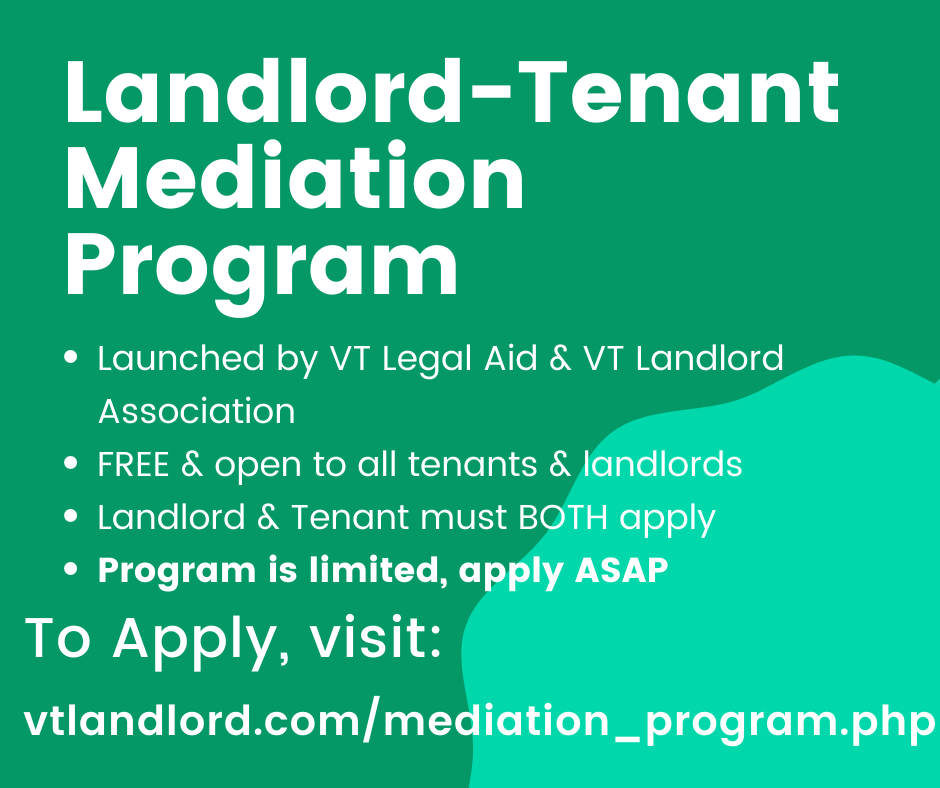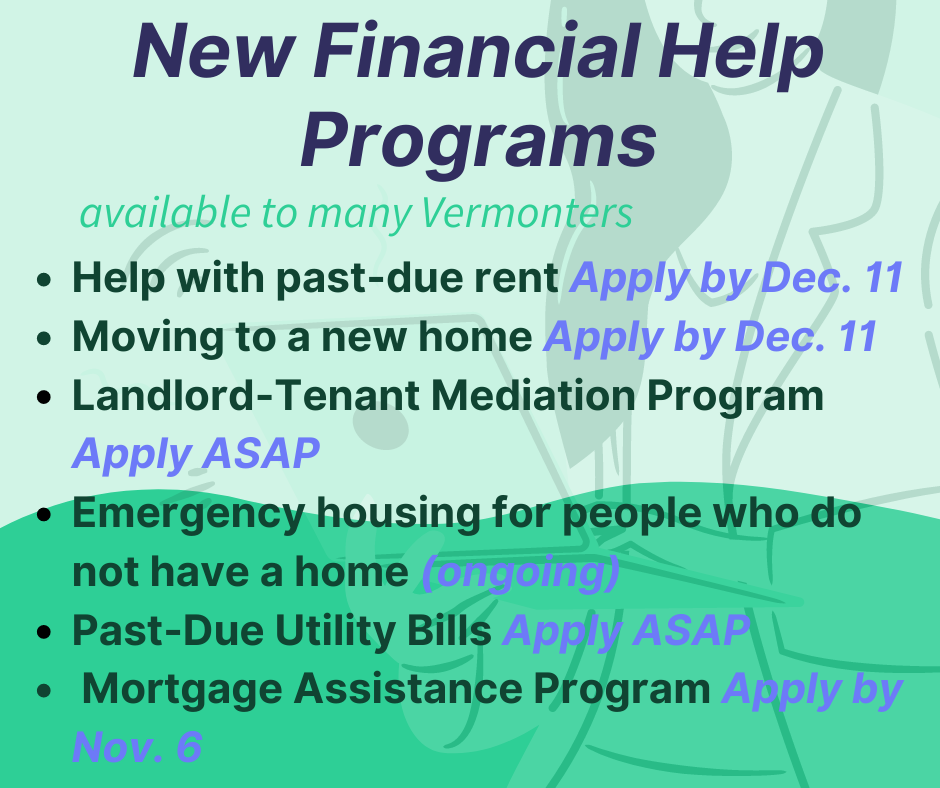Vermont Legal Aid and the Vermont Landlord Association have launched a Tenant-Landlord Mediation Program. The program is free and open to any landlord and tenant who has disputes that need to be mediated.
The Tenant-Landlord Mediation Program’s purpose during the eviction moratorium is to help landlords and tenants find solutions to the problems between them. During “mediation,” a neutral third person helps people discuss and try to resolve disputes. Program Information can be found here: https://www.vtlandlord.com/public_resources.php The program is limited, so apply ASAP

The Landlord-Tenant Mediation Program in Context:
Since the pandemic, a few key resources have emerged to offer tenants additional protections so that they can shelter-in-place during this time when having housing is so critical. The state of Vermont has a ban on evictions through three separate laws or rules: the federal CARES Act, the Vermont Judiciary’s emergency rules, and a state law called S.333 which pauses all evictions since last May until the governor ends the state of emergency. Vermont Legal Aid keeps updates around the eviction moratorium here.
While the eviction moratorium does not absolve tenants from paying rent, tenants who haven’t been able to pay all or some of their rent are eligible for relief through the Rental Stabilization Program. The Rental Stabilization program is a $25 million program which gives renters and landlords a way to apply for coronavirus relief funds to cover unpaid rent, even if it was from before March of 2020. Participation in the Rental Stabilization requires communication between tenants and landlords, as both need to apply. We wrote more about the Rental Stabilization Program here.
“This is a way of addressing the tensions between some landlords and tenants- very few have had this issue, almost 4,000 pairs have applied and received funds,”
Wendy Morgan, an attorney at Vermont Legal Aid, speaking to the Landlord-Tenant Mediation Program
Sometimes issues other than money get in the way of landlord/tenant relationships- that’s where the mediation program comes in. The Tenant-Landlord Mediation Program is a way to help address these more complicated problems. Wendy Morgan, an attorney at Vermont Legal Aid, tells us the program builds on the larger goal initiated by the Rental Housing Stabilization Program to keep people housed during the pandemic. “This is a way of addressing the tensions between some landlords and tenants- very few have had this issue, almost 4,000 pairs have applied and received funds,” Wendy told the Fair Housing Project.
Angela Zaikowski, Director Vermont Landlords Association, adds, “In an attempt to be mindful that there are situations that are not working for landlords and tenants, this mediation program hopes to provide an outlet for some of the disputes between landlords and tenants. It is a path for the parties to take advantage of given that the normal process through the courts is not available right now.”
Applicants for the Landlord-Tenant Mediation Program do not have to be a partof the Rental Stabilization program, but both the landlord and tenant have to apply.
These programs are developing rapidly and can be hard to keep track of. If you are a tenant and you are unsure if you are eligible for any of these programs, if you have concerns with your current tenancy, or you need help applying to any of these programs always feel free to call our
Vermont Tenants Hotline (802) 864-0099

A Message from Vermont Legal Aid and Legal Services Vermont: During these difficult times, new financial help programs are available to many Vermonters. The state does not want people to be struggling to pay bills, so please apply, even if you don’t usually get public help. Vermont Legal Aid has more information on these programs on our website: https://vtlawhelp.org/.
1. Help with past-due rent Apply by Dec. 11
For help with past-due rent, Vermonters should apply for the Rental Housing Stabilization Program through the Vermont State Housing Authority (VSHA.org). Tenants and landlords apply for this program at the same time. There are no income limits. VSHA pays landlords directly to bring the tenant’s rent account current. You can get help now, and apply again if you still need help later.
2. Moving to a new home Apply by Dec. 11
Some people need to move because of life safety problems with their rental unit, the rent is too expensive, they have trouble with the landlord or other tenants, or the unit is too big or too small. If you need to move and have found a new landlord, apply together for the Money to Move program at vsha.org. The program can cover the money needed to move in, such as first and last month’s rent and security deposit. It also may cover rent payments through the end of this year.
3. Free mediation program for landlord-tenant disputes during the moratorium. Apply ASAP
Sometimes issues other than money get in the way of settlement and dismissal of eviction cases. Mediators are available to help landlords and tenants solve those issues and maintain tenancies. File joint application found at www.vtlandlord.com.
4. Emergency housing for people who do not have a home
The Department of Children and Family’s (DCF) Economic Services Division is extending housing supports for homeless households. For more information or to apply, contact the Benefits Service Center at 1-800-479-6151. If you stay in a shelter or motel, you need to participate in “coordinated entry.” You will be assigned a housing case manager who will help you access subsidies and programs to help you get permanent housing. To learn more about coordinated entry, call 2-1-1. If you worked with your case manager to apply for a subsidy or other program and your application was denied, call Vermont Legal Aid at 1-800-889-2047.
5. Past-Due Utility Bills Apply ASAP
The Department of Public Service (DPS) can help pay past-due utility bills. The bills can be for electric, natural gas, landline telephone service or regulated private water bills (not municipal water). Homes and small businesses are eligible. There are no income limits, and you don’t have to have a disconnect notice. However, unless the rules are changed (please check), your difficulty paying the bill must be linked to COVID and the funding only covers arrearages after March 1, 2020. If you need help to fill out an application online, contact your local community action agency. Learn more on the Department of Public Service website under “COVID-19 Arrearage Assistance Program.”
6. Mortgage Assistance Program (and maybe Property Tax Assistance) Apply by Nov. 6
This program can pay up to six past-due mortgage payments on your home. It is available to all Vermonters who:
-are at least 1 month past due on mortgage payments
-have a COVID-related hardship, and
-meet the income requirements.
Even people who have mortgages in forbearance are eligible. Apply if you have a mortgage and are behind on property taxes. Vermont Housing Finance Agency is taking applications for the VT COVID Emergency Mortgage Assistance Program at VHFA.org. (You do not need to have a VHFA mortgage to be eligible.)